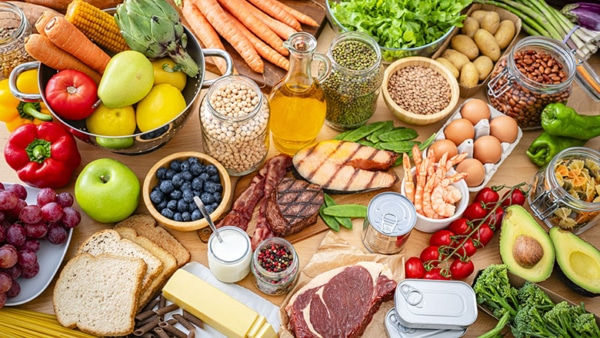Foods That Are Good for the Kidneys and Your Whole Body

Your kidneys may not have a say in whether you eat that Detroit-style pizza, but if they do, they might suggest going light on the brick cheese.
When we choose what foods to eat, we tend to think of how they will affect our digestion, weight, and even alertness. But everything you consume, including pizza, also affects your kidneys.
This is because your kidneys filter waste from all that enters your bloodstream, including food. In doing so, they balance nutrients such as proteins, potassium, and phosphorous – the latter of which you’ll find plenty of in brick cheese.
Too much phosphorous and certain other nutrients may damage the tiny filters in your kidneys, called tubules. This is particularly true if you are among the one in three adults at risk of kidney disease, according to the National Kidney Foundation. What you eat also can contribute to urinary tract infections, kidney stones, and kidney cancer.
All of which means that foods that are good for the kidneys can make you feel better in many ways.
How to Choose Foods That Are Good for Your Kidneys
Your kidneys, located on either side of your spine just above the waist, need to run efficiently. They clean nearly 50 gallons of blood daily, passing the excess fluid (urine) to the bladder, then returning the clean blood to your veins for circulation.
During this high-powered process, a lot of minerals and chemicals are filtered out, some of which take more work than others. The following food groups balance out these nutrients and therefore tend to be friendlier to the kidneys, studies show.
- Earthy proteins – Nuts, beans, and other plant-based proteins are high in fiber and “good” fats. For example, soybeans and some nuts and seeds carry omega-3 fatty acids, a healthy fat. But note: Chia seeds are high in oxalates, contributing to kidney stones. Eat them with high-calcium foods to keep oxalates in check.
- Low-fat animal proteins – Animal proteins tend to be rich in fats and acids that can overwork the kidneys. Leaner, kidney-friendly animal proteins include fish, skinless poultry, eggs, and low-fat yogurt.
- All kinds of veggies – Try to combine different veggies every day. Some are high in vitamin C, and others in vitamins A, B, or K (good for blood clotting). Dark leafy greens, root vegetables such as carrots and beets, and cruciferous veggies like broccoli carry antioxidants to support immunity
- Most fruits – Fruit is Mother Nature’s sweet alternative to veggies in terms of vitamins, fiber, and antioxidants. Eat a daily variety of apples, pears, oranges, berries, cherries, and pineapple, but cut back on bananas if you are at risk of kidney disease. They are high in potassium, which can be hard for kidneys to filter.
- Grain-based foods – Oats, brown rice, quinoa and other whole grains are a well-balanced source of fiber, vitamins, and minerals such as magnesium and zinc. Research finds whole grains can benefit people with kidney disease, as well as manage weight and sustain energy.
- Non-salty seasonings – Sprinkle cumin, chili powder, turmeric, and other spices on your foods to brighten the look, smell, and flavor. Spices are low in salt but full of antioxidants and minerals, a deliciously safe option for people prone to kidney stones.
Recognize the Symptoms of Kidney Conditions
If you experience pain in the lower back and sides, it might be a signal something is off with your kidneys. Don’t ignore this sign: One in seven adults have kidney disease, yet 90% are unaware, according to the National Kidney Foundation. Among common kidney conditions and their symptoms:
Urinary tract infection (UTI) – Up to 50% of women and 3% of men experience at least one UTI in their lifetimes, and these infections can become serious. If a UTI travels from the urethra or bladder to the kidneys, it can trigger a serious infection. Symptoms include acute pain in the lower back, nausea, and fever.
Kidney stones – Kidney stones are minerals that bind together and form into crystals, often due to dehydration and/or high concentrations of calcium and oxalates. Stones can remain in the kidneys for years or move to the ureters (the tube carrying urine from the kidneys). If a stone obstructs urine flow, it could instigate a painful infection. Common symptoms include acute pain on either side of the back and blood in the urine.
Kidney cancer – Kidney cancer, also called renal cell carcinoma, is a malignant tumor that grows in the kidney tubules. It is more likely to occur in men than women and is among the 10 most common forms of cancer. Because it develops in the tubules, kidney cancer is linked to kidney disease.
Improve Your Kidney Health, One Bite at a Time
Your kidneys play a big part in regulating your overall health, so they are only as good as what you eat. Instead of another slice of pizza, have an apple. Enjoy a balance of foods that are good for the kidneys, and they will balance the rest.
Learn more about the kidney conditions, symptoms, and treatments we offer here. If you want to consult one of our physicians about your kidney health, request an appointment online.

